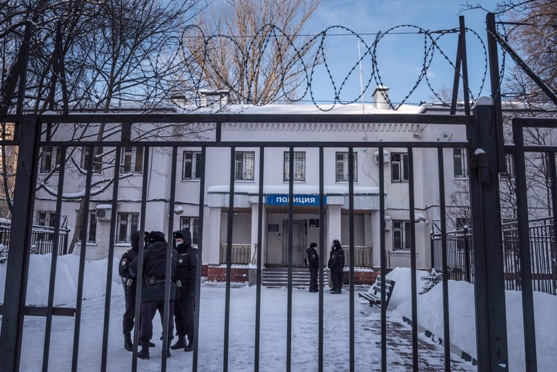Russian court orders Navalny held for 30 days
By Anton Troianovski and Ivan Nechepurenko
MOSCOW — A judge ordered Russian opposition leader Alexei Navalny to be jailed for 30 days, before a decision that could put him behind bars for years, after an extraordinary, rushed court hearing Monday (18) held inside a police station within a day of his return from Germany.
Moments after the judge announced her decision, Navalny called for protests in a video message to his supporters. One of his top aides, Leonid Volkov, said Navalny’s nationwide network was preparing to organize demonstrations across Russia on Saturday.
“Do not be afraid,” Navalny said in the video, which he had recorded in a makeshift courtroom set up in a police station meeting room. “Take to the streets. Don’t do it for me; do it for yourselves and for your future.”
The fast-paced events came the day after Navalny, who spent months abroad recovering from a near-deadly poisoning, was arrested at a Moscow airport on accusations of violating the terms of an earlier suspended prison sentence. He spent the night at a nearby police station without access to a lawyer.
President Vladimir Putin has long sought to minimize Navalny’s significance — down to not uttering his name — but the decision on how harshly to crack down on Navalny and his supporters in the coming weeks could have far-reaching implications for the Kremlin. On Monday, condemnation of Navalny’s arrest poured in from the United Nations and just about every major Western capital, but the Russian government breezily dismissed the criticism.
“We are not a lady coming out to a ball,” Foreign Minister Sergey Lavrov said during a news conference, responding to a question about the damage done to Russia’s international image.
As international pressure mounted, Navalny faced a judge not in a regular courtroom, but inside the police station in Khimki, a city bordering Moscow, where he was being held. A lawyer for Navalny, Vadim Kobzev, said he was notified of the hearing minutes before it started.
Several hours after the hearing began, Kobzev said that Navalny had been ordered jailed until Feb. 15, pending another hearing on charges of violating the terms of a 3 1/2-year suspended prison sentence he received in 2014. Europe’s top human rights court said Navalny was unfairly convicted of financial crimes in that case.
Russia’s prison service said Navalny repeatedly violated parole, and it has petitioned to convert the suspended sentence into real jail time. If the court approves the petition, Navalny could remain in prison until July 2024 — after Russia’s next presidential election, which is scheduled to take place that March and in which Putin could run again.
Russia’s judicial system is not independent, but it usually aims to preserve the veneer of procedural impartiality in cases against opposition figures. On Monday, however, authorities seemed to be doing all they could to keep Navalny’s supporters off balance by processing his case at breakneck speed.
Images from inside the makeshift courtroom showed a judge in a black robe sitting at a simple table with a microphone, with a messy bulletin board behind her and a copy machine off to one side.
“What is happening here is impossible,” Navalny said in the video. “This is the highest degree of lawlessness — I can’t call it anything else.”
Olga Mikhailova, another lawyer for Navalny, said his legal team would file a formal complaint about Monday’s decision. The lawyers also said that he would be held in a high-security prison in central Moscow.
Navalny, long one of Putin’s most prominent critics, collapsed and fell into a coma in August, and was airlifted to Germany for treatment. Laboratories in Germany, France and Sweden determined he had been poisoned by a military-grade nerve agent from the Novichok family, which was developed in the Soviet Union and Russia.
The opposition leader vowed to return to Russia once he recovered and last week announced his plans to fly to Moscow despite the threat of arrest upon arrival.
That is exactly what happened Sunday (17) evening: After Navalny’s flight landed at Sheremetyevo Airport, police officers met him at passport control and took him into custody. He spent the night at Police Station No. 2 in Khimki, near the airport, and was denied access to his lawyer. Kobzev was not allowed into the police station until Monday morning.
-New York Times


